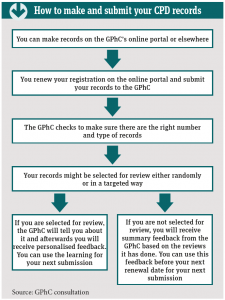GPhC to Introduce Revalidation for Pharmacists from March 2018
The General Pharmaceutical Council (GPhC) will introduce annual revalidation for pharmacists and pharmacy technicians from March 2018.
In a move to help reduce education errors and improve patient safety a new revalidation agenda brought in by the GPhC; all pharmacists will now have to submit to four clinical professional developments (CPD) records every year, along with another two CPD elements: “a record of a peer discussion and a record of a reflective account”.
What is revalidation?
Revalidation is the process by which the GPhC confirms all the professionals it regulates (pharmacists and pharmacy technicians) are up-to-date and fit to practise.
Doctors have been subject to revalidation by the General Medical Council since late 2012, while the Nursing and Midwifery Council introduced revalidation in April 2016.
So, what’s changing?
At the moment, pharmacy professionals declare that they meet set standards and are fit to practise when renewing their GPhC. This will not change under the current proposals. What will change is the way in which CPD is recorded, reviewed and how often it is submitted.
How often will it be reviewed?
A certain number of records will be selected for review, some at random and others will be targeted. The GPhC says this approach will ease the stress and workload many feel when their records are called for review every few years. Lay reviewers will also be part of the revalidation process to enhance the voice of patients and the public, and provide a better quality of feedback to the registrants.
What if I can’t submit each year?
There are certain cases where you are exempt from this rule, if for example you are long term sick or on maternity leave then it will be possible to renew your registration without submitting your records.
Under some circumstances, partial records will be accepted or an extension may be granted. However, if there is not a good reason for not submitting records, the GPhC will start the “remediation process”, which gives pharmacists another opportunity to submit their records. Failure to do so will be followed by a process known as “administrative removal”.
It is possible to be reinstated to the register after this, as long as a pharmacist submits their continuing professional development, peer discussion and reflective account records, and they are accepted.
When will the changes be brought in?
A staged introduction is planned to allow registrants the chance to get used to the new system. However, pharmacy professionals are advised to start using the new approach from March 2018 as reviews of the new CPD recording system will start in 2019, and 2020 for peer discussion and reflective accounts.
‹ Previous articleNext article ›